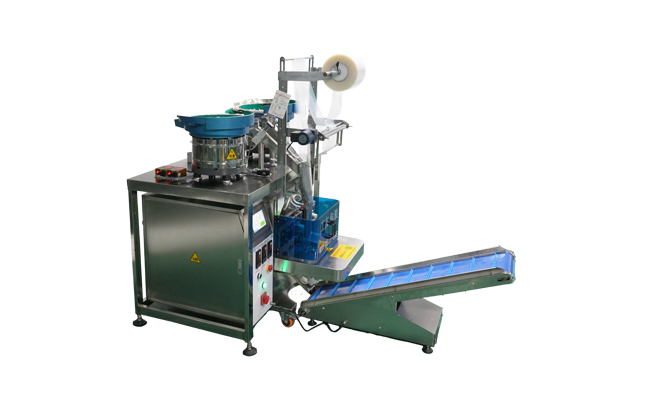
Date | 2023-05-14 07:50:31
Introduction:
The hardware industry plays a crucial role in the manufacturing sector, providing essential components and tools for various applications. To meet the increasing demand for efficiency and productivity, the hardware packing machine has emerged as a vital technological advancement. In this article, we will explore the features, benefits, and applications of this innovative machinery.
Efficient Packaging Process:
The hardware packing machine automates the packaging process, ensuring speed, accuracy, and consistency. It is equipped with advanced sensors and control systems that precisely measure and dispense the packaging materials. The machine efficiently seals the packages, minimizing the risk of damage during transportation.
Customizable Packaging Solutions:
One of the significant advantages of the hardware packing machine is its ability to accommodate different sizes and types of hardware components. By adjusting the settings, the machine can adapt to various dimensions, shapes, and weights, ensuring that each item is securely packaged. This versatility saves time and eliminates the need for manual sorting and packaging.
Enhanced Productivity:
With the hardware packing machine, manufacturers can significantly increase their productivity levels. The automated packaging process eliminates the need for manual labor, allowing employees to focus on other crucial tasks. Moreover, the machine operates at a consistent speed, minimizing bottlenecks and ensuring a smooth workflow.
Improved Product Protection:
Hardware components are often fragile and susceptible to damage. The hardware packing machine addresses this concern by providing enhanced protection during the packaging process. It uses cushioning materials, such as foam or bubble wrap, to safeguard the items from impacts and vibrations during transit. This results in fewer returns or replacements due to damaged products.
Cost Efficiency:
Implementing a hardware packing machine offers long-term cost benefits for manufacturers. By automating the packaging process, the machine reduces the reliance on manual labor, leading to reduced operational costs. Additionally, the precise dispensing of packaging materials minimizes waste, resulting in further cost savings.
Applications in Various Industries:
The hardware packing machine finds applications in diverse industries, including construction, automotive, electronics, and more. It is capable of packaging various hardware items such as screws, bolts, nuts, washers, and small tools. With its customizable settings, the machine can accommodate the unique packaging requirements of different industries.
Conclusion:
The hardware packing machine revolutionizes the packaging process in the hardware industry, providing efficient, customizable, and cost-effective solutions. Its ability to automate the process, enhance productivity, protect products, and cater to different industries makes it an indispensable tool for manufacturers. As the demand for hardware components continues to grow, the hardware packing machine will play a vital role in meeting the industry's packaging needs efficiently and effectively.Smart Integration and Connectivity:
In recent years, hardware packing machines have witnessed significant advancements in terms of smart integration and connectivity. These features allow manufacturers to streamline their operations, monitor the packaging process in real-time, and gather valuable data for analysis and optimization.
Internet of Things (IoT) technology has been integrated into hardware packing machines, enabling them to connect with other devices and systems within the production line. This connectivity facilitates seamless communication and data exchange, leading to improved coordination and efficiency.
Through IoT connectivity, manufacturers can remotely monitor the performance of the hardware packing machine, track the production status, and receive real-time alerts for any issues or anomalies. This proactive approach enables timely intervention and minimizes downtime, ensuring uninterrupted production.
Furthermore, the integration of machine learning and artificial intelligence algorithms enhances the capabilities of hardware packing machines. These algorithms analyze data collected from sensors, historical performance, and external factors to optimize packaging processes. By continuously learning and adapting, the machine can make intelligent decisions regarding packaging materials, settings, and adjustments, resulting in improved efficiency and reduced waste.
The smart integration of hardware packing machines also extends to the integration with enterprise resource planning (ERP) systems. This integration allows for seamless information flow between the packaging machine and other systems, such as inventory management and order processing. As a result, manufacturers can maintain accurate inventory levels, optimize order fulfillment, and enhance overall supply chain management.
In addition to streamlining operations, the connectivity and data gathering capabilities of hardware packing machines provide valuable insights for manufacturers. By analyzing the collected data, manufacturers can identify patterns, trends, and areas for improvement. This data-driven approach enables continuous optimization of the packaging process, leading to increased productivity, reduced costs, and improved customer satisfaction.
Conclusion:
The evolution of hardware packing machines goes beyond automation and efficiency. The integration of smart technologies, connectivity, and data analytics has transformed these machines into intelligent and adaptive systems. By leveraging IoT, machine learning, and connectivity with ERP systems, manufacturers can achieve real-time monitoring, proactive maintenance, and data-driven optimization. The hardware packing machine is no longer just a packaging tool but a crucial component of a smart and interconnected manufacturing ecosystem. Embracing these advancements will enable manufacturers to stay competitive in the ever-evolving hardware industry while meeting the increasing demands for efficiency, quality, and customization.
